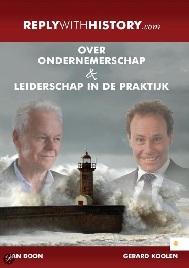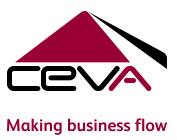144. The blockade is inside
Gerard,
Last time, I wrote about my experiences with FinTech start ups and that it is not so easy to obtain these new developments via a merger within your company. At least for companies of the size of my company with up to 50 employees. Obviously, for many larger companies it is a piece of cake to buy a start up. This obviously happens frequently, and companies will need to continue to do so to continue to develop and renew themselves. (more…)
143. The new Holy Grail
Hi Gerard,
It seems that everyone is involved in connecting things with things, without a human hand intervening. In the financial world, work is also being done on new technological developments. The collective term here is FinTech and there are currently many conferences and magazine articles on this subject. There seems to be a kind of mania in the air that we are all looking for the new Holy Grail. Listed companies who say they are engaged in the IOT (Internet of Things) have high valuations. Just as at the beginning of the internet bubble, integration in our daily life is the main topic. Then too there were very high valuations for internet companies. (more…)
142. The chance to invent a new Google is now
Dear Erik,
I occasionally hear people say about successful entrepreneurs that ‘if only I had known this before’ or ‘I would have done that much better’ or ‘I also had this idea’ or ‘what luck these guys have’ or ‘why didn’t I have that idea?’ or ‘why does this never happen to me?’ or ‘I just never have good fortune’ or ‘everything just comes naturally to some people’. A lament about how they did not realize their secretly dreamed of successes. Because whether you choose to admit or deny or it, we all have (or had) our limitless dreams about huge successes. Only for most people this remains a dream and the reason for this lies in ourselves and has nothing to do with the possibilities that life offers to everyone. (more…)
141. The secret of algorithms (as old as the hills)
Dear Erik,
Algorithms are said to be the new Holy Grail. Google’s success comes from smart algorithms, as it does for Airbnb, Facebook, LinkedIn and many more mainly internet companies. If you want to make money you have to work with algorithms. But there is nothing new about algorithms and I am sure you apply dozens of them in your company. Every business process is in fact an algorithm. So what are algorithms and how can you benefit from them? (more…)
140. Je hoofd leegmaken
Hallo Gerard,
Ik herken het gevoel wat je beschrijft in je vorige column. Dat zal overigens gelden voor de meeste mensen met een bedrijf of drukke baan. Dat je hoofd overloopt van alle werkzaamheden die snel uitgevoerd moeten worden. Je hebt nog allerlei kleine zaken die op je bureau liggen die nog gedaan moeten worden maar geen haast hebben en de stapel loopt op en op. En dan zijn er ook aan je gerichte verzoeken die niet direct aan het welvaren van het bedrijf. Ik ben nog ouderwets en hang overal van die gele post its op, maar als er te veel gele briefjes hangen ben ik het overzicht kwijt.
Dan grijp ik terug op het tijdmanagement kwadrant van Stephen Covey. Deze beroemde schrijver van managementboeken had negen kinderen en tweeënvijftig kleinkinderen, dus ik geloof hém wel als hij een handvat aanreikt voor effectief tijdmanagement. Hij heeft dus vier kwadranten.
Alle taken kan je hierin verdelen.
Kwadrant I is urgent en belangrijk
Kwadrant II is niet urgent en belangrijk
Kwadrant III is urgent en niet belangrijk
Kwadrant IV is niet urgent en niet belangrijk
Dus alle verzoeken gericht aan ondernemers waar jij op doelt in je vorige column die niks bijdragen aan het bedrijf vallen in kwadrant IV. De overige kwadranten geven je een handvat welke taken je eerst kan afronden. De schrijver waarschuwt wel dat kwadrant II hierdoor overgeslagen kan worden, maar dat dit een valkuil is omdat deze taken die hierin vallen wel belangrijk zijn voor de lange termijn van het bedrijf.
Het zou mooi zijn als er een soort automatisch systeem is, waar je jouw doelen en de bedrijfsdoelstellingen in noteert en vervolgens voer je de taken en werkzaamheden hierin. Als dit systeem dan aangeeft in welke volgorde je deze taken dan moet uitvoeren heb je een mooie toepassing voor drukke mensen . Behalve dat ze al werkdruk hebben,voelen ze immers ook een bepaalde stress omdat ze twijfelen welke taken het eerst te moeten uitvoeren.
Werk jij eigenlijk in je bedrijf met dit soort oplossingen, algoritmes? Je noemde in je vorige column het bedrijf Über, dit bedrijf is gebouwd op algoritmes. Het is nu een beetje een modewoord aan het worden. Bedrijven zoals Über en Airbnb worden neergezet als algoritmebedrijven en niet als een alternatief voor taxi’s en hotels. Wij zijn nu algoritmes aan het maken voor het nemen kortstondige beleggingsbeslissingen voor een actief beleggingsfonds. Ik kan me voorstellen dat er bij jou ook heel veel toepassingen zijn te verzinnen, maar misschien gebruik je ze al.
Maar dat het een modewoord is komt mede voort uit het feit dat de huidige gedachte is,dat als je bedrijf geen algoritmes hebt je de toekomstige boot gaat missen. Bedrijfsprocessen en werkzaamheden kunnen hierdoor versneld en verbeterd worden en ook toepassingen voor klantvriendelijkheid kunnen hiermee geschapen worden. Ben jij hier bang voor of omarm je deze gedachte of denk je dat het niet zo een vaart zal lopen?
Groet,
Erik
139. Not Now
Dear Erik,
I recently listened to a podcast entitled ‘I love marketing’ in which a successful American entrepreneur interviews other entrepreneurs. About a quarter of the time, they are saying how good they are, but the remaining three-quarters of the time is always (for me) very inspiring.
This time David Bach was interviewed, who built a flourishing company over 25 years mainly focused on financial advice for women. He is also the author of ‘The Automatic Millionaire’ and several other best sellers.
His story is very inspiring and tells exactly the same story as in column 137, but also the opposite. What you need to do to make your business successful. According to David his success, among other things, is due to the following:
- A strong passion. He wants to help as many women as possible to become financially independent,
- He worked day and night. Organized presentations at numerous venues for very small audiences,
- He applied for 10 years to be on the Oprah Winfrey show and only succeeded after 10 years,
- He travelled the entire country giving lectures and promoting his services,
- He constantly adapted and improved until he was eventually discovered and appreciated by a large audience,
- He overcame an enormous amount of resistance, because nobody believed in the potential for success.
One particular aspect was examined in greater detail and that was agreeing to third-party requests. Acquaintances, business associates, other entrepreneurs, people in your network are always asking for favors that are hard to refuse, but can take a lot of time to complete. Possible opportunities and other activities which you spend your time on as an entrepreneur may turn out to be important, but yield nothing in relation to the goals you’ve set. It was made clear how important it is to politely refuse many of these requests, because in the first place you are responsible for the welfare of your own business and do not have the time to provide a service to everyone without limits. With regard to all such activities and opportunities that present themselves endlessly and which are perhaps fun or interesting, they also suggested that you have to let them be.
As an example, they mentioned the CEO of Uber. He declines all requests for interviews, lectures, and seminars. All possible ideas and opportunities that are not directly applicable to his company are written down and taped to a bulletin board titled ‘Not Now’. The enormous focus that he exhibited has undoubtedly led to the current success of Uber, along with his tremendous perseverance. Before Uber was a success, they had a long period when no money was made and the outcome was very uncertain. How many people can and are willing to be so one hundred percent focused?
Sincerely,
Gerard









